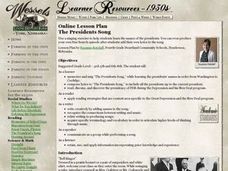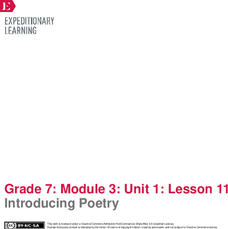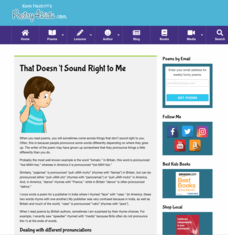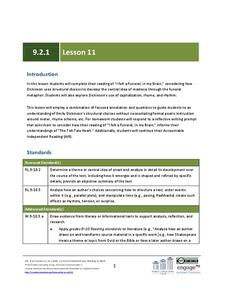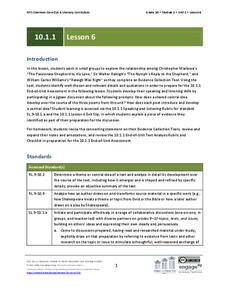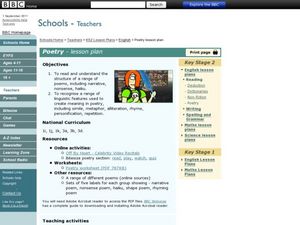Trinity University
The Shakespearean Sonnet
Looking for a great lesson to teach your class everything they need to know about Shakespearean sonnets? Here's such a lesson. "Sonnet #18" launches a study of the Shakespearean sonnet. Scholars watch two Prezi presentations that provide...
Curated OER
Using Poetry As Inspiration for Composition
A reading of Robert Frost’s "The Road Not Taken" launches an interdisciplinary study of the connection between the meters of a poem and a melody. After identifying the number of beats in each line of the poem, young musicians use...
Curated OER
The Presidents Song
Remember learning to spell “encyclopedia” by singing along with Jiminy Cricket? How about using a singing exercise to learn the names of the presidents? “The Presidents Song,” includes the names, in order, from Washington to Coolidge....
Teaching Tolerance
Poetry and Storytelling Café
Academics take turns as actors in an engaging poetry cafe. Elementary learners work in small groups to create original poems or stories addressing community issues and read their work in front of a live audience. Scholars also reflect...
EngageNY
Introducing Poetry
A silent reading session permits class members to meet individually with their teacher to discuss their text. Learners then discuss and express their observations about two poetry quotes, recording thoughts about craftsmanship, forms of...
Poetry4kids
That Doesn’t Sound Right to Me
Does pajamas rhyme with llamas to you? If it does (and even if it doesn't), an online lesson on rewording poetry for regional pronunciation may be helpful for you and your students.
Poetry4kids
Playing With Your Food Poem Lesson
What's more fun than playing with your food? Writing a poem about it! A quick and straightforward lesson guides young writers through the steps of writing a funny, well-structured poem about combining sports and food.
Poetry4kids
Rhythm in Poetry: Okie Dokie, Here’s the Trochee
Iambs and trochees may seem intimidating to some learners, but after reading a straightforward online lesson, they'll be masters of poetic feet! The lesson includes examples of trochaic poems from Edgar Allen Poe and William...
Poetry4kids
Rhythm in Poetry: More Than Two Feet
Want to put some feet in your head? Check out an online lesson about spondees, dactyls, and anapests to bring new structure to your poetic forms.
Poetry4kids
Rhythm in Poetry: The Basics
What makes a great poem sound so good? Learn the rhythmic secrets of poetry with an explanatory online lesson.
Education Closet
West Side Shifts
Combine math, language arts, music, and dance with an activity focused on "America" from West Side Story. After listening to the song, learners compare the film to Romeo and Juliet, analyze the song's meter, design choreography, plan...
College of the Canyons
Free Verse
Free verse poetry is often regarded as poetry without structure, but in reality, it is a poetic form that adheres to its own poet's thought and breath patterns. Delve into the rules and famous examples of free-verse poetry with a short...
Hong Kong Special Administrative Region
Learning English through Poems and Songs
Exposing learners to the power of words in poetry is a stimulating way to learn languages. Songs, haikus, rhyming words, and narrative works are all employed in a resource for teaching English as a Second Language.
EngageNY
Grade 9 ELA Module 2: Unit 1, Lesson 11
The capitalization rules are strict and inflexible—until you experience the fluid beauty of an Emily Dickinson poem. Ninth graders test their existing knowledge of language arts conventions with the many bent grammar rules in "I Felt a...
EngageNY
Grade 9 ELA Module 2: Unit 1, Lesson 10
An engaging unit connects Edgar Allan Poe and Emily Dickinson's shared themes of madness and departure from reality. The 10th lesson in the unit explores Dickinson's figurative language and structure choices in "I Felt a Funeral, in my...
EngageNY
Grade 9 ELA Module 2: Unit 1, Lesson 9
Continue analyzing literature using textual evidence with a lesson on "I Felt A Funeral, in my Brain" by Emily Dickinson. Ninth graders bring their annotation skills and knowledge of figurative language from the previous eight sessions...
EngageNY
Grade 10 ELA Module 1: Unit 1, Lesson 4
Guide high schoolers through the most successful and efficient ways to address a text with a literary analysis instructional activity. As learners find examples of alliteration in Christopher Marlowe's "The Passionate Shepard to His...
EngageNY
Grade 10 ELA Module 1: Unit 1, Lesson 3
Poets write love letters, but how often do the objects of their love write back? Compare Christopher Marlowe's "A Passionate Shepard to His Love" to Sir Walter Raleigh's response, "The Nymph's Reply to the Shepherd," with an engaging...
EngageNY
Grade 10 ELA Module 1: Unit 1, Lesson 2
If you only read a poem once, you'll miss many levels of analysis and comprehension. High schoolers finish reading "The Passionate Shepard to His Love" by Christopher Marlowe and discuss how the poem's organization contributes to its...
EngageNY
Grade 10 ELA Module 1: Unit 1, Lesson 5
If you've ever wished you could respond to an author's message, an instructional activity that connects three poems with the same concept will appeal to you. Based on the first few lessons' focus on Christopher Marlowe's "The Passionate...
EngageNY
Grade 10 ELA Module 1: Unit 1, Lesson 6
Wrap up your literary analysis unit with a discussion activity as tenth graders prepare for an end-of-unit assessment. After they have read and annotated Christopher Marlowe's "The Passionate Shepard to His Love," Sir Walter Raleigh's...
Winterhill School
Poetry Analysis
Gain greater insight into poems using a poetry analysis worksheet. Here, scholars follow steps and answer questions to dissect any poem. Topics include the poem's meaning, theme, technique, and structure, as well as personal...
Curated OER
Poems: Identifying Patterns
Here is a great learning exercise that contains two short poems to compare and contrast. Children will read each poem out loud and then complete three comparative analysis questions which focus on rhyme, structure, and language....
Curated OER
Different Types of Poetry
Provide pupils samples of different types of poems including haikus, narrative, nonsense, shape, and rhyming poems. In groups, class members read the poems, establish their general meaning, identify poetic devices, and rate the poems,...




